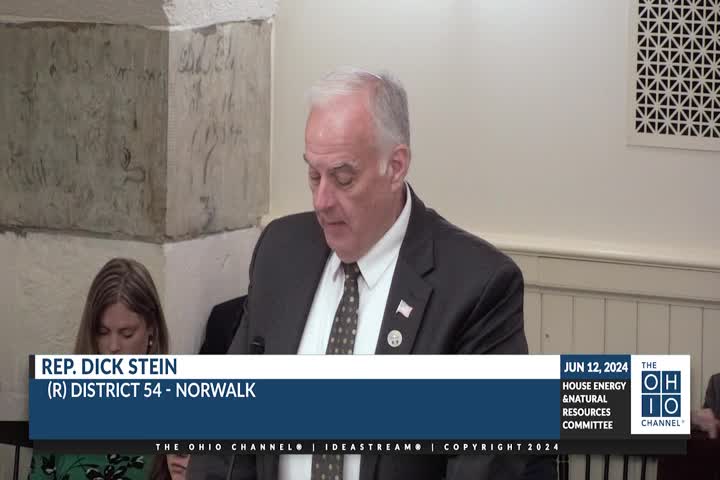Ohio faces power crisis as EPA rules threaten grid stability
June 12, 2024 | Energy and Natural Resources, House of Representatives, Committees, Legislative, Ohio

This article was created by AI summarizing key points discussed. AI makes mistakes, so for full details and context, please refer to the video of the full meeting. Please report any errors so we can fix them. Report an error »

During a recent government meeting, Ohio lawmakers expressed urgent concerns regarding the reliability of the state's electrical grid, highlighting a potential crisis in energy generation. Representatives from the Ohio electric cooperatives and industry stakeholders warned that the region could face significant power shortages in the coming months and years, urging immediate action to address the situation.
The discussions centered around the implications of new Environmental Protection Agency (EPA) regulations aimed at reducing carbon emissions from power plants. Critics argue that these rules, which impose stringent requirements on coal and natural gas plants, could lead to the premature closure of existing facilities and hinder the construction of new ones. This could exacerbate the already fragile energy landscape in Ohio, where demand for electricity is expected to rise.
Representative Stein emphasized the lessons learned from states like California and Texas, where aggressive moves away from fossil fuels have resulted in soaring electricity prices and reliability issues. He recounted the challenges faced during the winter storm Elliott in December 2022, when Ohio's energy infrastructure struggled to cope with extreme weather, leading to power shortages and calls for residents to conserve energy during the holidays.
In response to these challenges, House Resolution 469 was introduced, calling on the federal government to reconsider the EPA's regulations that could jeopardize Ohio's energy security. The resolution has garnered bipartisan support, reflecting a growing consensus among lawmakers about the need for a reliable and affordable electricity supply.
Craig Grooms, COO of Buckeye Power, echoed these sentiments, warning that the EPA's final rule could lead to the closure of nearly all coal-fired power plants in the U.S., which currently supply about 20% of the nation's electricity. He highlighted the potential economic repercussions, including job losses and increased electricity costs for consumers.
As the meeting concluded, lawmakers reiterated their commitment to ensuring that Ohio can maintain a stable energy supply without excessive federal interference, emphasizing the importance of balancing environmental goals with the practical needs of the state's residents and businesses. The discussions underscore a critical moment for Ohio's energy policy as stakeholders prepare for potential legal battles against the new EPA regulations.
The discussions centered around the implications of new Environmental Protection Agency (EPA) regulations aimed at reducing carbon emissions from power plants. Critics argue that these rules, which impose stringent requirements on coal and natural gas plants, could lead to the premature closure of existing facilities and hinder the construction of new ones. This could exacerbate the already fragile energy landscape in Ohio, where demand for electricity is expected to rise.
Representative Stein emphasized the lessons learned from states like California and Texas, where aggressive moves away from fossil fuels have resulted in soaring electricity prices and reliability issues. He recounted the challenges faced during the winter storm Elliott in December 2022, when Ohio's energy infrastructure struggled to cope with extreme weather, leading to power shortages and calls for residents to conserve energy during the holidays.
In response to these challenges, House Resolution 469 was introduced, calling on the federal government to reconsider the EPA's regulations that could jeopardize Ohio's energy security. The resolution has garnered bipartisan support, reflecting a growing consensus among lawmakers about the need for a reliable and affordable electricity supply.
Craig Grooms, COO of Buckeye Power, echoed these sentiments, warning that the EPA's final rule could lead to the closure of nearly all coal-fired power plants in the U.S., which currently supply about 20% of the nation's electricity. He highlighted the potential economic repercussions, including job losses and increased electricity costs for consumers.
As the meeting concluded, lawmakers reiterated their commitment to ensuring that Ohio can maintain a stable energy supply without excessive federal interference, emphasizing the importance of balancing environmental goals with the practical needs of the state's residents and businesses. The discussions underscore a critical moment for Ohio's energy policy as stakeholders prepare for potential legal battles against the new EPA regulations.
View full meeting
This article is based on a recent meeting—watch the full video and explore the complete transcript for deeper insights into the discussion.
View full meeting
